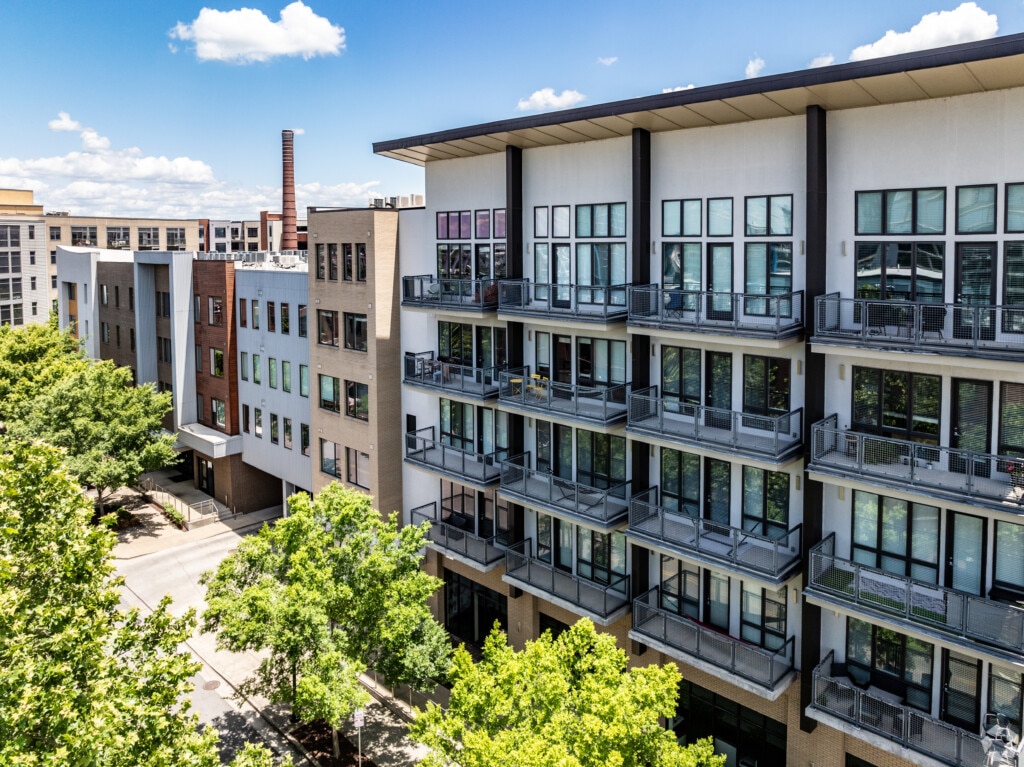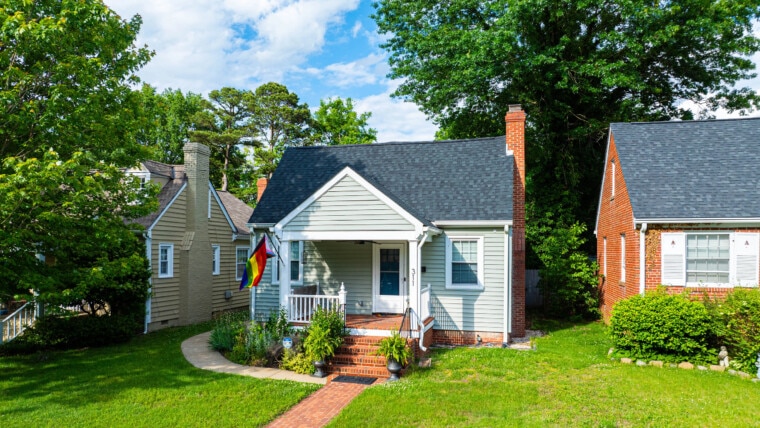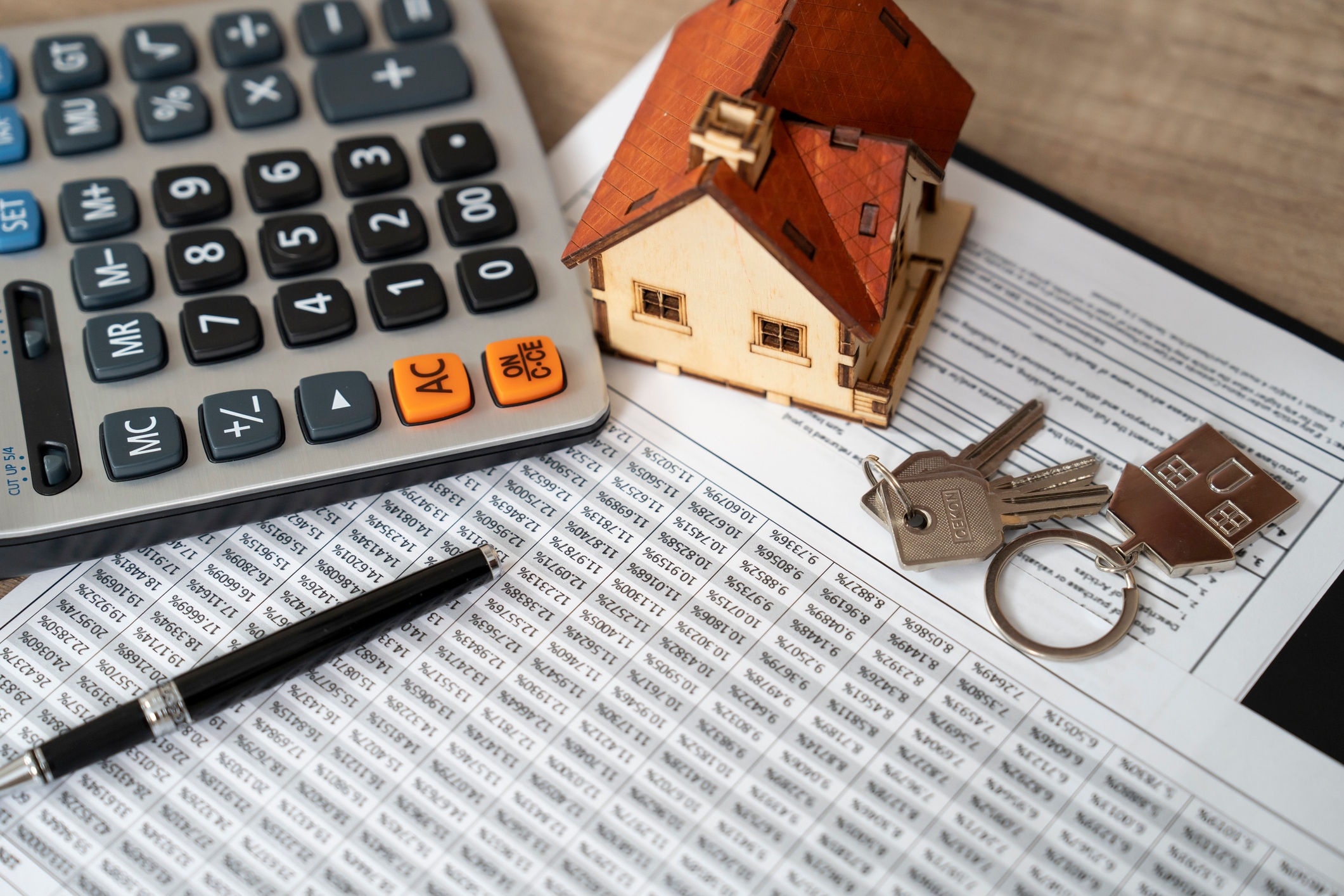Condominiums are typically less expensive than single-family homes. While the national median sales price of a single-family home is $422,100, the median sales price of a condo is $354,200.
Condo ownership comes with monthly fees, which cover maintenance of communal areas and upkeep of amenities. However, these fees may allow residents to spend less money on upkeep than they would with a single-family home.
What Is a Condo?
“A condo is basically just a structure of ownership,” says Carol Zuckert, a real estate agent licensed in Connecticut and South Florida. “In a condo, you’re buying and owning a piece of a building outright.” That ownership applies to the condo unit itself, as well as shared ownership of common areas within a condo development.
Condos are commonly organized as apartment-style dwellings in larger buildings with hallways and lobbies. They could also refer to smaller garden-style buildings or row house-style homes, where the residence has a private exterior entrance and shares walls with adjacent units.
Condos typically require monthly fees from the residents who live there. These fees go toward expenses such as maintenance and upkeep, as well as insurance and reserves. One of the benefits of condo ownership is the availability of amenities, which may include a gym, pool, tennis court, private park, snow removal and more.

The Condo Buying Process
Buying a condo is not all that different from buying a single-family home. The steps toward purchasing look pretty much the same. However, some considerations will be different. For example, condo ownership means that you are subject to community rules. Your home may also feel less private since there is shared communal space.
Define Your Budget
Before buying a condominium, you will need to clearly understand what you can afford for a down payment. Your monthly budget should include the condo mortgage payment, as well as property taxes, homeowners insurance and condo fees.
Work with a Real Estate Agent
Consider working specifically with an agent who specializes in condo sales in your area. They will have a better understanding of the local condo market and a broader network of people in that corner of the industry.
Define Your Needs and Wants
Knowing how many bedrooms and bathrooms you want your condo to have is a good starting point, but you should also consider amenities, parking and pets.
“Pets can be a big issue,” Zuckert warns. In South Florida, where the agent represents several condos, “newer buildings seem open to pets, but older buildings typically are not.”
Zuckert also mentions that finding a spacious three-bedroom condo can be a challenge. Many of the units in condo developments typically have just one or two bedrooms. Discuss your priorities with your agent, and be upfront about what you’re looking for.
Get Pre-Approved for a Mortgage
After you know what you’re looking for in a condo, it’s time to get pre-approved with a lender. Pre-approval can help speed up the homebuying process and make your offer more appealing to sellers. When you get pre-approved for a loan, you’ll also be able to lock in your interest rate and gain a better understanding of the terms of your financing.
However, some buyers purchasing a condo may find that securing a home loan is a little more difficult. For example, if you plan to finance with an FHA loan because of the lower down payment or more flexible credit score requirements, you can only purchase a condo in an FHA-approved building. Mortgage lenders will also consider the building’s age, structural integrity and finances before issuing a condo loan.
Find Your Perfect Condo with Homes.com
Homes.com has a comprehensive search tool that makes it easy to find condos in your area. When you search homes for sale, you can input your location, budget, bedrooms, bathrooms, amenities and home type. There’s also a condo building search that connects you with beautiful buildings in your area, making it easy to find exactly what you’re looking for.
Research and Network
To help make your condo-buying decision easier, use your network. Talk with your real estate agent and a financial advisor to discuss the value and appreciation of the unit you’re considering. Ask your real estate agent if they can put you in contact with any current residents, too. They will likely give you honest feedback about their experience in the community.
One of the most important connections you can make before submitting an offer on a condo is with the building manager.
“I call them upfront and let them know I have a client who’s interested,” Zuckert says. She likes to have her clients speak with the building manager to better understand things, such as any issues that the community needs to address in the near term.
Review Condo Documents
Even if a condo seems like a perfect fit, it’s critical to review the documents before signing on the dotted line. Look for details such as the frequency of fee increases and restrictions on private and public area gatherings.
If large, unexpected expenses arise, condo residents could be required to pay a special assessment to cover the cost.
“Buyers have a right to review the contracts in what’s called an inspection period,” Zuckert says. “Make sure you’re comfortable with not only the rules and regulations but also the financials of the building and how they’re run.”
Zuckert says that she typically sees inspection periods that are between 10 to 15 days, with five days to review the condo association documents. Still, this timeline can vary widely depending on your location and market.
Closing Day
Closing day is an exciting moment when you finally receive the keys to your new condo and become the homeowner. Talk with your real estate agent and attorney about everything required to close on your home, including your government-issued ID, the closing disclosure from your mortgage lender, and any other legal documents required to complete the closing process.
The Pros and Cons of Buying a Condo
| Pros | Cons |
| Affordability | Condo Fees |
| Included Maintenance | Rules and Regulations |
| Availability Amenities | Limited Privacy |
| Sense of Community | Appreciation and Value |
| Security |
The Advantages of Buying a Condo
Affordability
Condos are typically less expensive than single-family homes in a given area. This makes them a great option for first-time homebuyers and those who want to downsize.
Included Maintenance
One of the reasons you pay condo fees every month is to cover the maintenance of the building, communal areas and amenities.
“You don’t have to deal with the maintenance at the same level as you do a single-family home,” Zuckert says. “The building takes care of things like window washing, insects, that sort of thing. You just have to take care of what’s inside your own individual unit.”
Available Amenities
With a condo, you’re more likely to have access to recreation facilities like a pool, fitness center and tennis court. Some communities even have common areas like a private beach, rooftop deck, clubhouse, private parks or co-working spaces. Services like snow removal and lawn care are also handled for you.
Sense of Community
Getting to know your neighbors and sharing a sense of place is one of the best things about living in a condo. “There can be a sense of community,” Zuckert says. “You see the same people at the pool or at the beach.”
Security
Many buyers are drawn to condos for their increased security. Condo buildings might have a doorman, cameras and possibly even a dedicated security staff, which can deter crime, including theft. This may be especially important for people purchasing a condo as a second home who will leave the unit unattended for long periods of time.
When speaking to a building manager prior to purchase, you may consider asking about the security features of a given building.
The Potential Drawbacks of Buying a Condo
Condo Fees
According to USA Today, the national average HOA fees are $191 per month or $2,292 per year. However, many condo owners pay even more. Those monthly fees could be more expensive in high-cost living areas and newer, more luxurious buildings.
Rules and Regulations
While most rules and regulations should aim to maintain a clean, safe and comfortable neighborhood or community, some rules will likely feel arbitrary.
“There will be some rules and regulations you may not always want to abide by,” Zuckert says. “Like, if you have an umbrella on your balcony, it can only be white – that sort of thing.”
Rules like these may mean you have less control over the exterior of your home.
Limited Privacy
Condo living is like communal apartment living. You’re likely to share at least one wall with neighbors. You could have neighbors on either side of your home and possibly above and below you. In addition, your next-door neighbor’s balcony could peer directly into yours.
Appreciation and Value
One of the benefits of purchasing a condo is that they are typically more affordable than townhouses and single-family homes. Unfortunately, this also means that condos usually will appreciate in value more slowly.
“Assuming they’re in the same condition and a desirable location,” Zuckert says, “you have better appreciation with a single-family than a condo.”
The Bottom Line on Buying a Condo
A condo can be a great first home purchase or an opportunity for empty nesters to downsize and move to their retirement destination. They typically offer amenities that would be out of reach with a single-family home. There’s also a greater ease of living since your condo fees will go toward the cost of maintenance.
Still, condo living is not for everyone. The community rules and regulations may turn off some homebuyers, while others may want an asset that will appreciate more significantly over time.
Frequently Asked Questions About Buying a Condo
A condo is typically less expensive than a single-family home of comparable size, making it a great option for first-time homebuyers, empty nesters and retirees. However, condos will generally appreciate in value more slowly than single-family homes. Buyers should weigh the appreciation potential when deciding if a condo is the right financial investment for them.
Living in a condo will be similar to living in an apartment. You’re likely to have neighbors who share at least one wall with you, which could lead to noise disruptions and privacy concerns. Condos are also run by a management company, which can impose rules on residents that may not suit everyone’s lifestyle.
As long as a building is well maintained and the location remains desirable, a condo will generally appreciate in value over time. However, it will likely appreciate slower than comparable single-family homes in the same area.
Grace Cassidy is a freelance writer covering the beats of real estate and interior design. She served as the final editor of Curbed Hamptons, and has bylines in publications such as Apartment Therapy, Zillow's Out East, Cottages & Gardens, and more. Originally from Long Island, Grace lives in San Diego.














